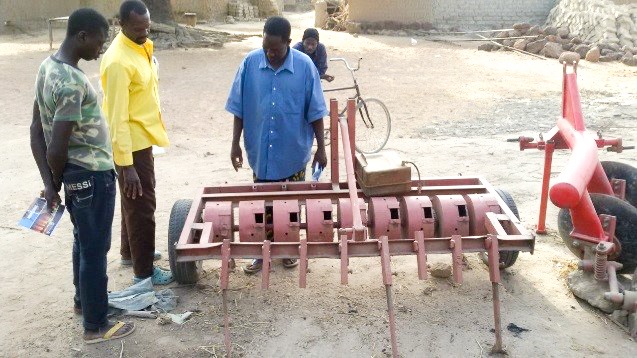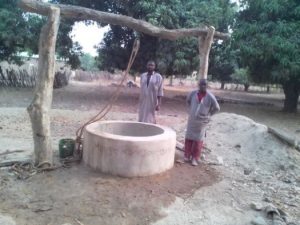
The tractor-adapted motorized seeder designed by the president of the Nièta Cooperative.
Photo: Adama Bengaly (G-Force)
The Nièta Cooperative of Diambala is located in the community of Bougouni in the Sikasso region of Mali. The 12 members produce millet, sorghum, and rice.
The cooperative partnered with the Feed the Future Cereal Value Chain (CVC) project in 2014. Several training courses conducted by CVC were essential for the development of the cooperative, including courses on the Sell More For More curriculum, millet and sorghum best production practices, post-harvest training, intensive rice production, and establishment of commercial relationships with traders, input suppliers, and financial intermediaries/banks.
The Sell More For More training helped the cooperative lay the foundation for good governance and transparent management, while also restructuring the cooperative so that it could be formally registered.

The training on good rice production practices led members of the cooperative to question their old practices and adopt more efficient production practices, such as using a more efficient motorized seed drill rather than seeding by hand. As a result of this training, Oumar Koné, the president of the cooperative, developed a tractor-adapted motorized seed drill. This seeder was built by local blacksmiths, and has the capacity to sow 5–6 hectares per day. Farmers from surrounding villages came to witness the seeder demonstrations.
Training provided by the CVC project also helped introduce the practice of warehouse receipt credit programs in the village of Diambala. Thanks to the increase in the area planted, the cooperative sold 10 tons of rice at $10,273 through a warehouse credit program. A portion of the funds from the sale financed a large new well in the village. The well now supplies 31 families with drinking water.
The desire to equip my cooperative with an agricultural machine of this type was born after a series of trainings received with the CVC project. These trainings focused on the advantages of direct seeding.” – Oumar Koné, president of the Nièta Cooperative







